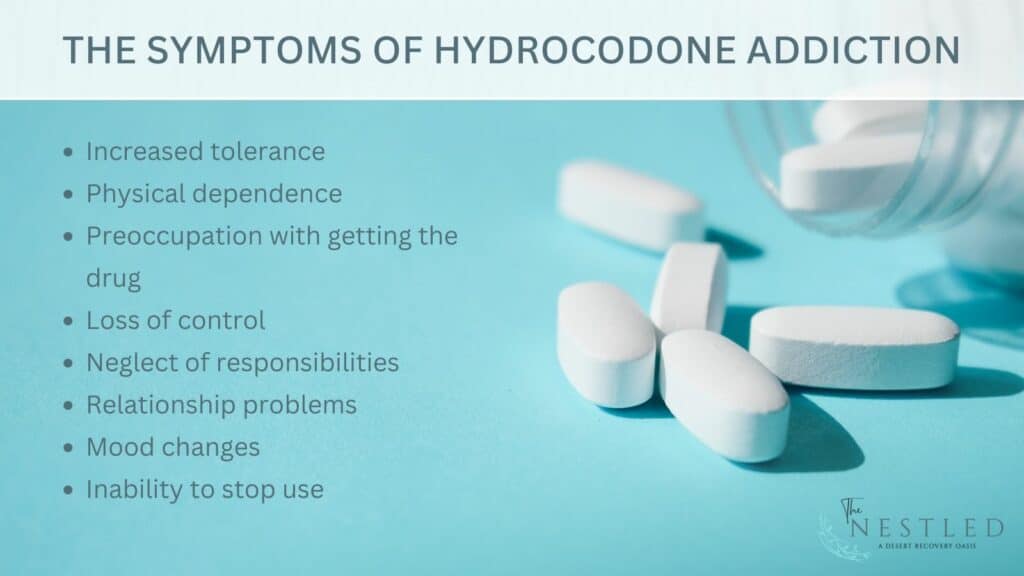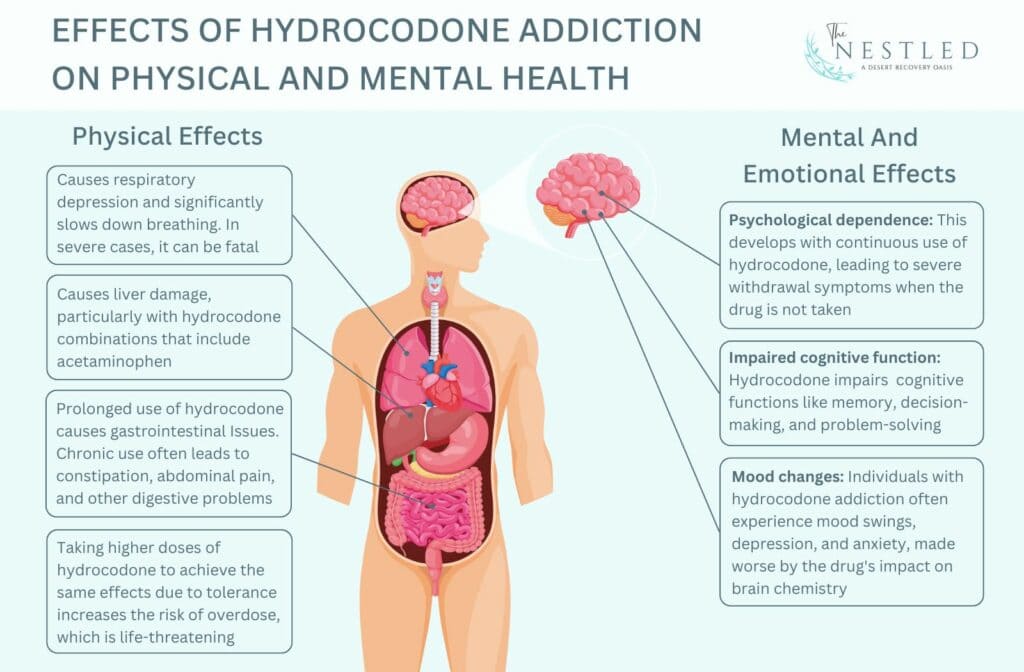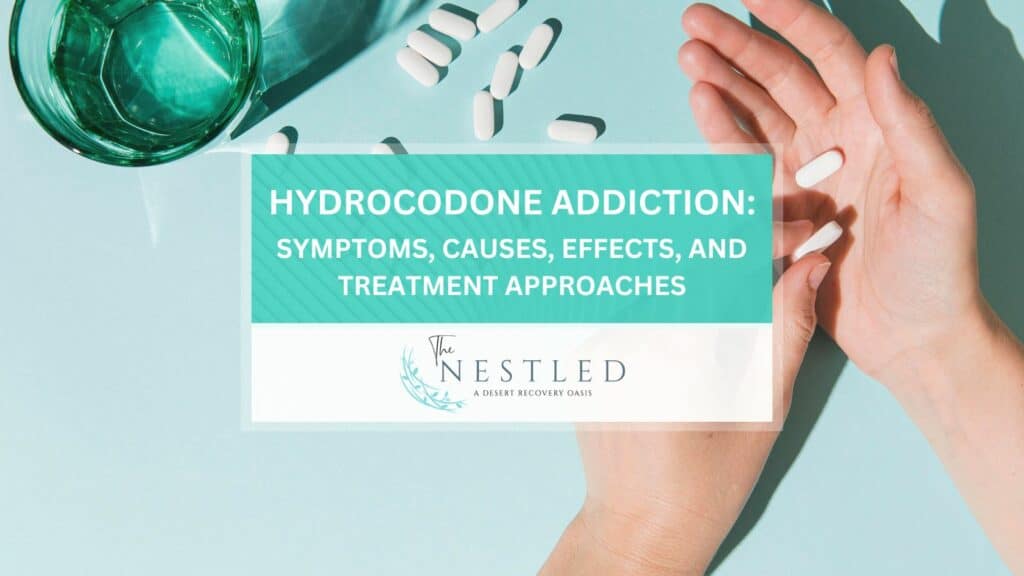Hydrocodone addiction is a compulsive urge to use the prescription opioid hydrocodone despite its adverse consequences. It is a dependency on hydrocodone that develops when the brain adapts to regular hydrocodone use, leading to physical and psychological reliance. The 2016 National Survey on Drug Use and Health (NSDUH) reported that 6.9 million people in the U.S. aged 12 and older misused hydrocodone in the past year compared to 7.2 million in 2015.
Symptoms of hydrocodone addiction include cravings, tolerance, withdrawal symptoms, nausea, sweating, loss of control, Inability, neglect of responsibilities, and continued use despite harm.
Causes of hydrocodone addiction include genetic predisposition, environmental influences, psychological factors, and physical pain.
The effects of hydrocodone addiction include health complications such as liver damage, decreased brain function, and respiratory depression. It also causes psychological effects like mood swings, anxiety, depression, and social consequences like legal and financial problems
Treatment approaches for hydrocodone addiction involve detoxification, Medication-Assisted Treatment (MAT), counseling, behavioral therapies, support groups, comprehensive care, and aftercare.
What Is Hydrocodone Addiction?
Hydrocodone addiction is an intense urge to use the opioid painkiller hydrocodone despite its negative consequences on the user. Hydrocodone is a strong painkiller that doctors usually prescribe to treat severe pain. However, long-term usage or misuse leads to increased tolerance and addiction.
Hydrocodone addiction happens because the body and brain get used to having the drug regularly. Over time, people with this addiction feel like they need the drug just to feel normal and may find it very hard to stop using it.
Hydrocodone addiction often starts with the individual using hydrocodone as prescribed by a doctor, feeling like they need more of the drug to feel the same pain relief. They take more than recommended, leading to addiction.
People with hydrocodone addiction often keep using the drug even if it causes problems with their health, work, or relationships. They also experience withdrawal symptoms—like nausea, sweating, and anxiety—if they try to stop or cut down on hydrocodone. These symptoms make quitting hard without professional help.
According to a 2022 report from the National Survey of Drug Use and Health Report, 2022, out of 8.5 million individuals who misused prescription painkillers in the past year, 3.7 million of them abused hydrocodone products.
Hydrocodone addiction is severe and requires treatment that includes medications, counseling, and support from professionals to help manage cravings and withdrawal and to learn healthier ways to cope with pain and stress.
What Are The Symptoms Of Hydrocodone Addiction?

According to the American Addiction Centers, the symptoms of hydrocodone addiction include increased tolerance, preoccupation with the drug, mood changes, dependency, loss of control, physical changes, neglect of responsibilities, and withdrawal.
- Increased tolerance: Abuse of hydrocodone leads to tolerance. The user starts to need more drugs to get the same pain relief or high.
- Physical dependence: The brain adapts to the chemical contents of hydrocodone and cannot work well without it—any attempt to stop the drug results in withdrawal symptoms.
- Preoccupation with getting the drug: Individuals with hydrocodone use disorder find themselves spending a significant amount of time planning how to get and use it, neglecting their activities and responsibilities.
- Loss of control: people with hydrocodone addiction problems lose control over the choice to stop or reduce taking the drug.
- Neglect of responsibilities: hydrocodone addictions result in the prioritization of drugs over family responsibilities, work, and other obligations.
- Relationship problems: Addiction puts a weight on relationships with family, friends, and coworkers. People with hydrocodone use disorder tend to withdraw from social activities and isolate themselves to hide their addiction.
- Mood changes: hydrocodone addiction increases the risk of mood swings, irritability, and depression. The intense craving results in agitation and restlessness when they cannot access the opioid.
- Inability to stop use: hydrocodone addiction causes its victim to fail to stop using the drug despite seeing the adverse effects it is having on them. These effects may be health, financial, or legal problems.
What Are The Causes Of Hydrocodone Addiction?
The causes of hydrocodone are genetic predisposition, brain chemistry, psychological factors, environmental influences, and self-medication.
- Genetic Predisposition: Individuals with a family history of addiction are at higher risk of developing similar problems.
- Brain Chemistry: Hydrocodone works by binding to opioid receptors in the brain, releasing high levels of dopamine and creating feelings of euphoria. This rewarding sensation leads to repeated use, which develops into addiction when not stopped.
- Psychological Factors: Mental health disorders like depression, anxiety, or post-traumatic stress disorder (PTSD) often make individuals more prone to addiction. It increases the risk of self-medicating on hydrocodone to alleviate their symptoms.
- Environmental Influences: Factors such as peer pressure, family dynamics, stress, and exposure to environments where drug use is accessible contribute to the development of addiction.
- Inadequate Guidance or Monitoring: Lack of guidance from healthcare providers or inadequate monitoring of the patient’s use increases the risk of misuse and addiction.
What Are The Effects Of Hydrocodone Addiction?
The effects of Hydrocodone addiction are categorized into physical, mental, and social effects;
What Are The Physical Health Effects Of Hydrocodone Addiction?
The effects of hydrocodone on the physical health of the user are:
- Hydrocodone addiction causes respiratory depression and significantly slows down breathing. In severe cases, it can be fatal.
- The hydrocodone drug fact sheet provided by the Drug Enforcement Administration indicates that large doses of hydrocodone in combination with acetaminophen may cause severe liver damage.
- Prolonged use of hydrocodone causes gastrointestinal Issues. Chronic use often leads to constipation, abdominal pain, and other digestive problems.
- Taking higher doses of hydrocodone to achieve the same effects due to tolerance increases the risk of overdose, which is life-threatening.

What Are The Mental And Emotional Effects Of Hydrocodone Addiction?
The effects of hydrocodone on the mental health of the user are:
- Psychological dependence: This develops with continuous use of hydrocodone, leading to severe withdrawal symptoms when the drug is not taken.
- Impaired cognitive function: Long-term use of hydrocodone affects cognitive functions, impairing memory, decision-making, and problem-solving skills.
- Mood changes: Individuals with hydrocodone addiction often experience mood swings, depression, and anxiety, made worse by the drug’s impact on brain chemistry.
What Are The Social And Behavioral Effects Of Hydrocodone Addiction?
The 3 social and behavioral effects of hydrocodone addiction are job instability, strained relationships, and legal consequences.
- Strained relationships: Addiction causes strain on relationships, resulting in neglected relationships due to isolation and strained interactions with family and friends.
- Job instability: People addicted to hydrocodone are often not able to hold down a job. They experience a decrease in job performance and increased absenteeism, resulting in job loss and financial instability.
- Legal Consequences: Possession and use of hydrocodone without a prescription or obtaining it through illegal means have legal consequences.
What Are The Withdrawal Symptoms Of Hydrocodone Addiction?
The withdrawal symptoms of hydrocodone addiction are:
- Anxiety
- Agitation
- Muscle aches
- Nausea
- Vomiting
- Diarrhea
- Sweating
- Insomnia
- Dilated pupils
- Yawning
- Runny nose
- Goosebumps
- Fever
- Chills
How Do I Treat Hydrocodone Overdose?
Treating a hydrocodone overdose requires immediate medical attention. If someone is experiencing an overdose, call emergency services right away. While waiting for help, monitor the person’s vital signs and try to keep them awake and breathing.
Do not induce vomiting unless instructed by medical professionals. Emergency responders administer naloxone to reverse the effects of the overdose. It’s crucial to provide information about the amount and time of hydrocodone ingestion for appropriate treatment.
What Are The Treatment Approaches For Hydrocodone Addiction?
The American Addiction Center recognizes these 5 treatment approaches for hydrocodone addiction: detoxification, behavioral therapy, Medically-Assisted Treatment, counseling, and aftercare planning. According to a 2019 study by the Recovery Research Institute, about 489,465 primary opioid users have successfully maintained recovery from opioid use for a period ranging from one to five years.
Detoxification: Detoxification is the main and first step in treating hydrocodone addiction. It involves medically supervised withdrawal from hydrocodone to manage the acute physical symptoms of withdrawal safely. This process is often done in a hospital or a specialized detox center.
Medication-Assisted Treatment (MAT): MAT involves using drugs to reduce cravings and withdrawal symptoms and stabilize the individual. Common drugs used include:
- Methadone: It manages cravings and withdrawal symptoms without producing the high associated with opioids.
- Buprenorphine: It partially activates opioid receptors, reducing cravings and withdrawal symptoms.
- Naltrexone: It blocks opioid receptors and prevents hydrocodone from having any effect.
Behavioral Therapies: These therapies help patients modify their attitudes and behaviors related to drug use. It increases healthy life skills and works together with other forms of treatment, such as medication. Standard behavioral therapies include:
- Cognitive-Behavioral Therapy (CBT): CBT helps patients avoid and manage situations in which they are most likely to use drugs.
- Contingency Management: It uses positive reinforcement, such as rewards for positive behaviors.
Counseling: This option includes both individual and group counseling. Counseling sessions help individuals address emotional and psychological issues related to their addiction. It provides support and encouragement from peers who are facing similar challenges.
Aftercare Planning: Aftercare includes continuous support after the initial treatment phase. It involves outpatient treatment, group counseling, continued MAT, and regular check-ins with treatment providers to help prevent relapse.
Each treatment plan is planned according to the individual’s specific needs, considering factors like the severity of the addiction, personal health issues, and any co-occurring mental health conditions.
How Long Does It Take To Become Addicted To Hydrocodone?
The time it takes to become addicted to hydrocodone varies widely among individuals. According to Johns Hopkins Medicine, the duration to develop a physical dependence on opioids can differ among individuals, but it typically occurs within a couple of weeks. Factors like genetic predisposition, dosage, and personal health history also influence how quickly addiction forms.
Can Hydrocodone Addiction Be Cured?
There is no cure for hydrocodone addiction, but it is manageable with the right treatment plan. The American Addiction Center states that after detox, there are numerous care levels and diverse treatment options available for opioid use disorders, including those involving hydrocodone.
What Are The Risks Of Hydrocodone Addiction During Pregnancy?
Hydrocodone addiction during pregnancy is harmful to both the mother and the fetus. Risks include miscarriage, premature birth, low birth weight, and withdrawal symptoms in the newborn, known as neonatal abstinence syndrome (NAS).
How Does Hydrocodone Addiction Affect Mental Health?
Hydrocodone addiction increases the effects of existing mental health disorders such as depression and anxiety. It also leads to new mental health issues because of changes in brain chemistry related to prolonged drug use.
How does hydrocodone addiction differ from benzodiazepine addiction in terms of symptoms and treatment?
Hydrocodone addiction and benzodiazepine addiction differ significantly in terms of symptoms and treatment approaches due to the distinct pharmacological effects of each drug. Hydrocodone, an opioid, primarily affects the central nervous system, leading to symptoms such as euphoria, drowsiness, and respiratory depression. Withdrawal symptoms can include severe pain, nausea, and anxiety. Treatment typically involves medication-assisted therapies (MAT) like methadone or buprenorphine, alongside behavioral therapies. In contrast, benzodiazepine addiction involves symptoms like sedation, memory impairment, and muscle relaxation, with withdrawal symptoms including seizures and severe anxiety. Treatment often requires a gradual tapering of the drug to avoid withdrawal complications, supported by cognitive-behavioral therapy (CBT) and other psychological interventions.
How can hydrocodone addiction increase the risk of developing a morphine addiction?
Hydrocodone addiction can increase the risk of developing a morphine addiction due to the similar effects both opioids have on the brain’s reward system. As tolerance to hydrocodone builds, individuals may seek stronger opioids like morphine to achieve the same euphoric effects, leading to a transition from one opioid to another. This pattern of escalating use can quickly lead to morphine addiction, which may present with even more severe withdrawal symptoms and health risks.
Where To Find Treatment For Hydrocodone Addiction?
Treatment for hydrocodone addiction is readily available at rehabilitation centers, addiction treatment facilities, or through medical professionals specializing in addiction recovery.
What Are The Different Slang Terms For Hydrocodone?
Slang terms for hydrocodone include Vikes, Norco, and Watson-387.
How And Where Is Hydrocodone Typically Produced?
Hydrocodone is usually manufactured by pharmaceutical companies and is produced in controlled environments.
What Are The Law Enforcement Actions And Legal Ramifications Of Hydrocodone?
Law enforcement agencies focus on controlling hydrocodone distribution and use through legal means. According to the United States Department of Justice, hydrocodone is the most frequently prescribed opioid in the United States with more than 136.7 million prescriptions for hydrocodone-containing products dispensed in 2013.
What Are The Policies And Implications Related To Hydrocodone Control?
Policies regarding hydrocodone control aim to regulate its production, distribution, and use.
What Are The Legal Penalties For Using And Selling Hydrocodone?
The legal consequences for using and selling hydrocodone include fines, imprisonment, and legal records.
How Do The Effects Of Hydrocodone Addiction Differ From Those Of Cocaine Addiction?
The effects of hydrocodone addiction differ from cocaine addiction in terms of their impact on the body and mind.

Share This Post




